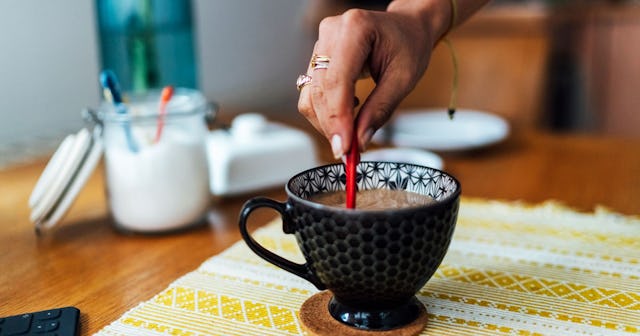How Your Afternoon Coffee Habit Is Affecting Your Sleep

If you’re a coffee enthusiast, you might think there’s no such as thing as too much of the stuff. But — and as a fellow coffee lover it pains me to say this — your afternoon coffee habit might be impacting your sleep. Sleep? Well, we’re parents; what sleep, you might ask? We’re talking about that sliver of heaven that occurs between when the kiddos fall asleep (aka Netflix and laundry) and eight hours later when you’re rolling yourself and your littles out of bed. Okay, we’re kidding, maybe six hours — max.
If eight hours feel like the exception and not the rule, you might blame stress or insomnia before pointing the finger at your 5pm Starbucks order so you can make it through dinner. If, though, you notice that the nights you struggle to fall asleep and stay asleep coincide with that afternoon coffee, it’s time you revisit your habit. Because honey, as great as coffee is, it isn’t worth giving up a solid night’s worth of rest.
It’s not IF your afternoon coffee habit affects your sleep, it’s HOW.
At the moment, a jolt of caffeine might be what you think you need to finish off the day. But according to a study in the Journal of Clinical Sleep Medicine, the truth of the matter is that caffeine, even as far as six hours before bed, can have an impact on your sleep. So when deciding if you’re going to have coffee in the afternoon, consider what time you plan on going to bed and falling asleep.
Dr. Ian Dunican supports this research, stating, “We know when people have caffeine before bed, that it delays sleep onset. It also can cause disruptions in sleep after falling asleep, which means more awakenings throughout the night.” So you’re telling us not only will you struggle to fall asleep, but to stay asleep too? Hard pass. This also doesn’t account for how sensitive your body is to caffeine in general. Because, yes, that’s a whole other thing to consider.
In a The Sleep Foundation article, Dr. Marta Maczaj reminds us that everyone’s body processes caffeine differently. “Some people are sensitive to caffeine, and others may metabolize it more slowly, resulting in difficulty falling asleep.”
Giving up your afternoon coffee habit may sound like an impossible feat. It may sound dramatic, but for many of us, especially those who have small people relying on us to stay awake past 4 pm, cutting out afternoon caffeine doesn’t feel doable.
Are you doomed to get subpar sleep forever? In short, no. Here’s how to negate the less-than-pleasant side effects of late afternoon caffeine.
Get better sleep, coffee or not.
Experts recommend two things: First, have a strong and consistent bedtime routine. Secondly, push the time your head hits the pillow off a bit if you can. Even on the days where your afternoon coffee habit is going strong, settling your body into a calming routine first can lessen the stimulating effect of caffeine.
After you put your littles to bed, it can feel like prime time to get everything done that you didn’t during the day — but doing that might not support your rest in the way you need it to. When you get ready to go to sleep, engage in a routine that promotes calm. Turn off your electronics an hour before you intend to go to bed to start disengaging your mind. Relax with a warm bath or shower, and follow it up with your favorite book or a cup of tea.
If you’re tired but not quite ready to drift off to dreamland, try giving yourself another 30 minutes to relax without forcing yourself to go to sleep. Remember, experts say consuming caffeine up to six hours before bedtime can impact your sleep. So if you enjoyed that grande latte around 4 pm, don’t try to force yourself to sleep before 10 pm.
If you can, try to lay off amping yourself up with caffeine after 12 pm. It’s one of those things that feels good at the moment, but you tend to regret later on. If afternoon coffee is a non-negotiable, make sure you make time to let yourself relax.
After all, even though we all want to be Super-Mom, in the end, we’re only human.
This article was originally published on